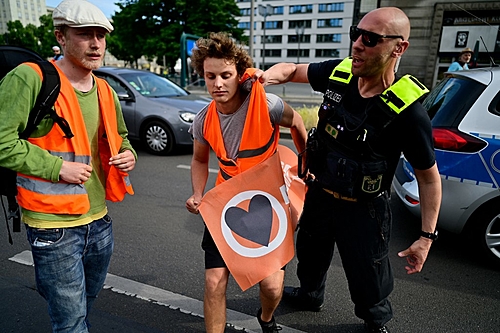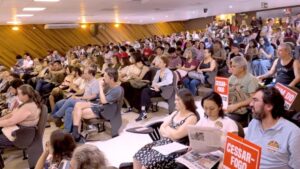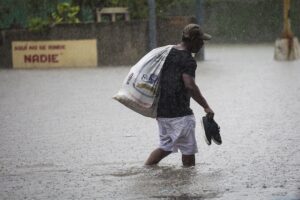
The Munich Public Prosecutor’s Office confirmed on Sunday (25/06) that German investigators have been tapping and monitoring several communications from the climate activist group Letzte Generation (Last Generation), following revelations in the German press about the case.
Surveillance involves telephones, emails and voicemails linked to the group or some of its members, the prosecution told the German news agency DPA.
Bavarian state authorities are currently investigating Letzte Generation under preliminary suspicion of forming or supporting a criminal organization.
The investigation follows a series of environmental protests carried out by the group, usually involving roadblocks and acts against works of art in museums and, more recently, against private buildings, planes and boats.
Surveillance against the group was revealed earlier this week by the Munich-based newspaper Süddeutsche Zeitung. According to the report, the tapping began last October and, among the monitored telephone lines, would be the press extension of Letzte Generation.
“As a journalist, like many others, I have been on the phone with representatives of Letzte Generation over the last few months. It is now clear: their phones have been tapped by the police since October. Even the official press phone,” he wrote in the Twitter Ronen Steinke, author of the report published in the Süddeutsche Zeitung.
“This is the extension with the Berlin area code that Letzte Generation uses as its official contact with the press. Every time journalists called there, investigators from the Criminal Police of the state of Bavaria were also on the line”, completed the journalist.
A spokesman for the Munich prosecutor’s office told DPA that the journalists were not targeted by the surveillance, but acknowledged that they “were affected by the measures because of calls made to the monitored phone numbers”.
The official also assured that issues such as freedom of the press were “appropriately considered” when deciding whether to allow wiretapping.
In some cases, cell phones of members of the activist group, email accounts and cell phone GPS location data were also monitored.
The group’s reaction
This weekend, Letzte Generation issued a statement claiming that monitoring by the police is unnecessary and that criminal investigations against the group are baseless.
“We protest with our names and faces, we publish our plans, we accept the legal consequences,” the group wrote on Twitter.
“Nevertheless, the LKA [polícia regional de investigação criminal] from Bavaria records our phone calls, emails and movements. Even our press phone was spied on. This is absurd!”
Carla Hinrichs, spokesperson for the group, also shared on her social media that details of her personal calls – including those to friends and family – were now being noted down in the files of a public prosecutor. “This is my reality,” she said.
The reaction of politicians
German Bundestag MP Lars Castellucci of the Social Democratic Party (SPD) said that “concerns about the radicalization of the climate movement must be taken seriously”, but stressed that “the investigation into the possible formation of a criminal group should not be an invitation to adopt measures that, in themselves, may radicalize suspects”.
For his part, the leader of the Left party, Dietmar Bartsch, claimed that the whole case against the group was an election campaign coup emanating from the conservative government of Bavaria.
Bartsch called the wiretapping “disproportionate” and said it “shows that it is wrong to politically influence our public prosecutions”. “They are being misused for the purposes of an inappropriate election campaign,” he accused.
Bavaria’s next state elections take place on October 8.
The investigations against Letzte Generation
Bavarian prosecutors launched criminal investigations against the environmentalist group last month, including police raids against some of its members.
Public response to the case was divided, with some calling the investigation an overreaction, and others welcoming the move.
German Interior Minister Nancy Faeser recently claimed that 580 possible criminal offenses have been attributed to the group or its members since the start of 2022, many of them related to coercion (often by delaying citizens on roads at roadblocks), vandalism or damage. the property.
Faeser, who is from the SPD, even defended the police action against the group. She argues that some of Letzte Generation’s protests were disproportionate and even risked alienating people from the environmental cause.
Since the investigation was launched, Letzte Generation has altered its protest tactics to focus on targets that are less disruptive to the public.
Instead of sticking to roads or breaking into art museums, as they used to do, activists have been spraying paint on public and commercial buildings and on smaller private aircraft and boats, saying they seek to cause less inconvenience to ordinary people, and more to emitters of radio. who profit from environmental destruction.
Source: www.brasildefato.com.br

